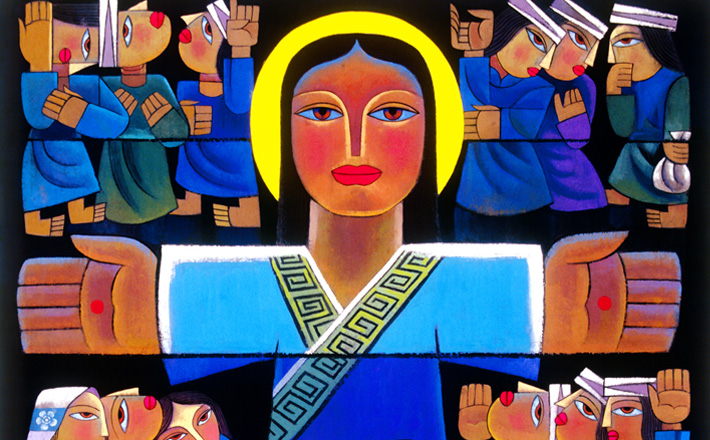Commentary on Revelation 1:4-8
We were not the intended audience of Revelation.
That is, John did not write primarily to modern Christians. After all, how could he have written to people living thousands of years later in a world radically different than his? Plus, why would the church have preserved these texts, pondered them, interpreted them if their intended audience remained in the distant future?
And yet these are the words of God for us today. These are living words of great theological depth too often neglected by some Christians or poorly interpreted by others. Too often, our fellow believers have dwelt on the fireworks of Revelation, on the dragons and horsemen that populate its pages, and thus have missed the contextual, theological, and Christological reflections that anchor this vision of God’s future.
This is the word of God for us today. They are words for us, however, by the means of some of the earliest believers in Christ Jesus. It is these faithful Christians of Asia[1] who are the first recipients of Revelation’s visions but also the seven letters with which John opens his marvelous composition. Thus, these opening verses invite us to read the rest of this text in light of the everyday experiences, struggles, and successes that marked these early Christian communities.
This is the word of God for us today even when the symbolism of Revelation baffles us. It is virtually certain that the earliest readers of Revelation knew the code with which John writes, even if we have lost the needed cyphers after all this time. John must have known that his writings would have been comprehensible, for he was not an esoteric psychic but a prophet, even a pastoral theologian. The letters that begin Revelation note his pastoral concern for these burgeoning communities. In many ways then, Revelation is akin to the Pauline correspondence. So, we ought to read Revelation as the reflections of faithful Christians on a broken, baffling world. How we ought to live is the question that drives Revelation.
This is the word of God for us today in a rule marked by the raw exercise of political power. The shadow of the Roman Empire would have fallen mightily on the earliest readers of Revelation. Notice the litany of praise attached to Jesus, “the faithful witness, the firstborn of the dead, and the ruler of the kings of the earth” (verse 5). The first acclimation confesses the truthfulness of the gospel embodied in Jesus Christ. The second trusts that death will not have the final say. The last is a bold and potentially treacherous statement.
The political ideology of Rome holds that the power of Caesar is absolute. Within this political ideology, their military and economic might only validates imperial dogma. To claim, therefore, that Rome is a servant of the true monarch of the world is to pledge allegiance to God alone. Such a confession will later serve as the theological backdrop of Revelation 18, where the demise of “Babylon” (that is, Rome) accompanies the victory of Christ.
This is the word of God for us today, not tomorrow. In many ways, Revelation is a text much more about the present than it is about the future. Notice verses 5b-6. Jesus has “freed us from our sins,” crafted a “kingdom” in our midst, and named us “priests.” These are not promised realities alone but tangible benefits that these seven churches can taste. We too as children of the same God can follow in their footsteps. Thus, Revelation is not oriented around anxiety and fear as so much twisted eschatological imagination has proposed. This book — and Christian eschatology more broadly — is about hope in a God we can trust and expectation for a future God has crafted.
This is a word about God for us today. The closing verse of our reading has Jesus famously declaring that he is the Alpha and the Omega, the A and the Z, the beginning and the end, the dawn of the world and its dusk. The eschatology of Revelation is thus not about providing a road map to the end of days, but Revelation is fundamentally about the character of God. Revelation is thus a radical way to shape how we relate to God and one another today. Eschatology is a posture of trust in God and God’s work. Revelation is not about bold predictions about days yet to come. The book is about seeing the work of God in the seemingly ordinary, unremarkable moments that fill our lives.
So, let me challenge preachers to take up this brief pericope. One excellent way to do this is to pair this short reading with two of the seven letters in chapters 2 and 3. In those letters, we discover vibrant communities whose strength belies their weaknesses. Revelation warns them to be wary of complacency. In those letters, however, we also discover afflicted communities whose faith and resilience was being constantly tested by their neighbors and their cultural contexts. Revelation exhorts them to lean into their faith in a Christ who holds the future in his hands.
In these too brief portraits of our faithful ancestors, we might just see our own struggles and successes reflected back to us.
[1]Asia in antiquity referred not to the whole continent but a region of the Roman Empire in modern day Turkey.


April 7, 2013